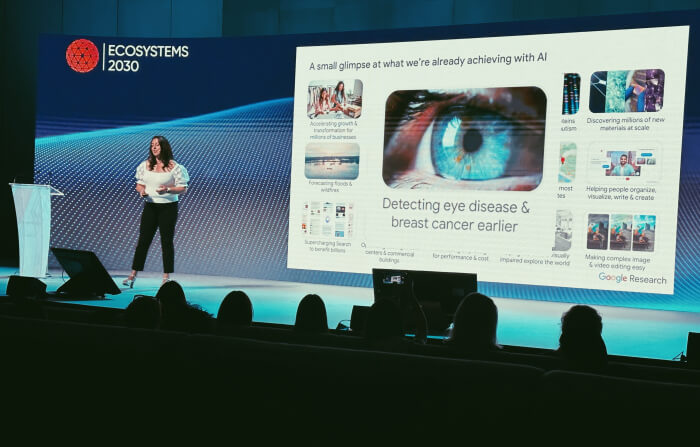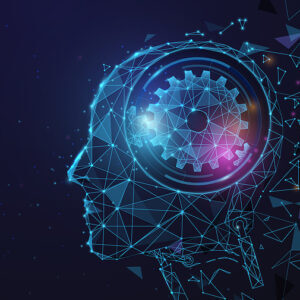I am one of those who believes what Seneca, the ancient Roman writer and statesman, said, “Travel and change of place impart new vigor to the mind.”
I don’t know if the stoic Seneca said that before or after his exile to the island of Corsica by the emperor Claudius.
Anyway, earlier this summer, my husband and I had the opportunity to visit a city in the country where Seneca was born: Spain. Both the city and the purpose of our trip imparted a new vigor to our minds.
We were invited to participate in the Ecosystems 2030 (ES2030) summit, held in A Coruña, a port city on a promontory in the Galicia region of northwest Spain, from June 26-29. The summit is the creation of a man with a vigorous mind: Omar Hatamleh, the head of AI at the National Aeronautics and Space Administration and the executive chairman of ES2030.
The annual summits in Spain — where Hatamleh lived and studied — gather speakers and participants from a wide swathe of professions, connecting the unconnected and spurring ideas. His stated aim for summiteers is for them to ditch linear thinking and “to successfully embrace disruption, transform your organization, and thrive over the next decade.” Hatamleh has used the same formula — cross-industry innovation — for meetings he has organized at NASA.
The agenda for this year’s summit, the fourth of 10, was “Women in Leadership.” And the women who addressed the summit were wonder women from private and public entities including Pilar Manchon, Google; Aylin Uysal, Oracle; Rika Nakazawa, NTT; JoAnn Stonier, Mastercard; Maria Fernandez, Sony Music Entertainment; Deepti Pahwa, an innovation and leadership coach to C-suites and entrepreneurs; Nancy Namrouqa, Jordanian minister of state for legal affairs; and Jennifer Stumm, a concert violist and founder and director of Illumina, a Sao Paulo-based music collective, festival and social group “working for greater equity and goodwill in classical music by young musicians around the world without access to private instruction or mentorship.”
In formal addresses and in conversations at lunches, dinners and in hotel lounges, these women shared their thoughts about new ventures and innovation in the AI age, the future of AI governance, e-commerce, privacy and social media, and even board member leadership. Their talk was of how they are shaping new frontiers not how they shattered barriers in the private and public sectors —refreshing and inspiring.
The summit was a movable feast, convening mostly at the avant-garde Palexco Conference Center, which is located at the city’s port and has a roof that resembles the wings of a giant seabird, the mayor’s office in the neoclassical-style City Hall, built in the early 20th century, and the two-Michelin-starred Pepe Vieira Restaurante & Hotel.
The restaurant and hotel, part of the Relais & Chateaux group, is located “in the upper area of Raxo, the smallest municipality of the municipality of Poio, in Pontevedra,” according to directions on its website.
It was an experience getting to the restaurant, which is about an hour-and-a-half drive from A Coruña through a sea of Galician vineyards and villages where the backyard of every house had wine grape vines. No grape escape.
The website says, “For a better experience in finding ‘the last kitchen in the world,’ follow our instructions, since Google has already gotten lost several times along the way.” That is truth in advising.
Pepe Vieira is located on a terraced hill overlooking the Pontevedra estuary. It is surrounded by woods, au naturel landscaping and “biodynamic” vegetable gardens, enjoyed on the patio or inside the dining room which has huge, picture windows.
Chef Vieira prepares dishes, combining “ancestral local produce, rediscovered through research with historians, scientists and anthropologists” with ingredients from afar. He prepared a variety of small dishes for us, including hake with Albariño lees, tapioca pearls and sorrel oil. His decision to locate the restaurant far from city pollution and his combination of gastronomy and sustainable gardening earned him a Michelin Green Star.
A Coruña is far from the anti-tourism protests in Madrid and Barcelona. While it is one of the chief ports of northern Spain, the country’s second-largest fishing center and has a shipyard for building fishing vessels, it also has a significant real-estate market for vacation homes — and welcomes tourists.
Cruise ships stop there and disgorge passengers who visit the Old Town and the New Town; the city’s churches, from medieval to modern; and notable landmarks, including the Roman Tower of Hercules, an imposing, square-shaped lighthouse dating from the reign of Trajan (98-117 AD). A characteristic feature of the houses is their window balconies, glazed for the Atlantic gales, giving A Coruña the name “Crystal City.”
Spaniards from the south come to this Galician city in the summer for the cool wind and the surf. As with many cities on Spain’s Atlantic coast, A Coruña is a surfer spot — with a bronze statue of two surfer dudes riding the waves in a fountain on a seafront avenue.

Photo Credit: Linda Gasparello
A Coruña has been discovered by the foodies, who have long flocked to San Sebastián, also on the Atlantic coast, close to the border with France. On the last night of Ecosystems 2030, the summiteers dined on some of the tastiest octopus in the city at Pulperia de Melide. The Galician dish of octopus sprinkled with paprika is a favorite of mine.
Seneca insisted on eating moderately, not indulging in luxuries or delicacies. He wrote,“Our aim is to live in accordance with nature, is it not?”
I don’t know if Seneca traveled to A Coruña, called Brigantium under the Romans. But I can imagine him being a happy stoic there.



